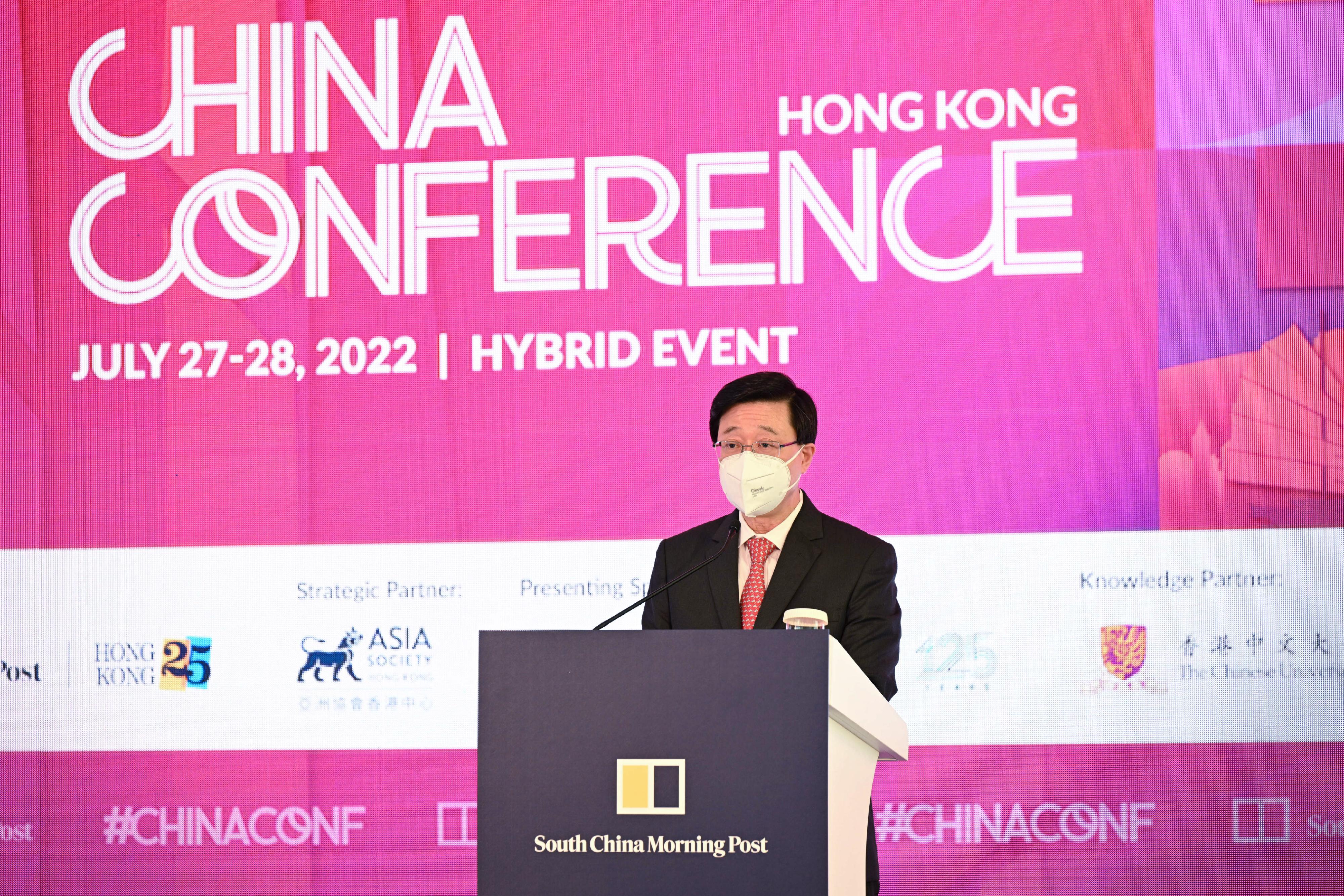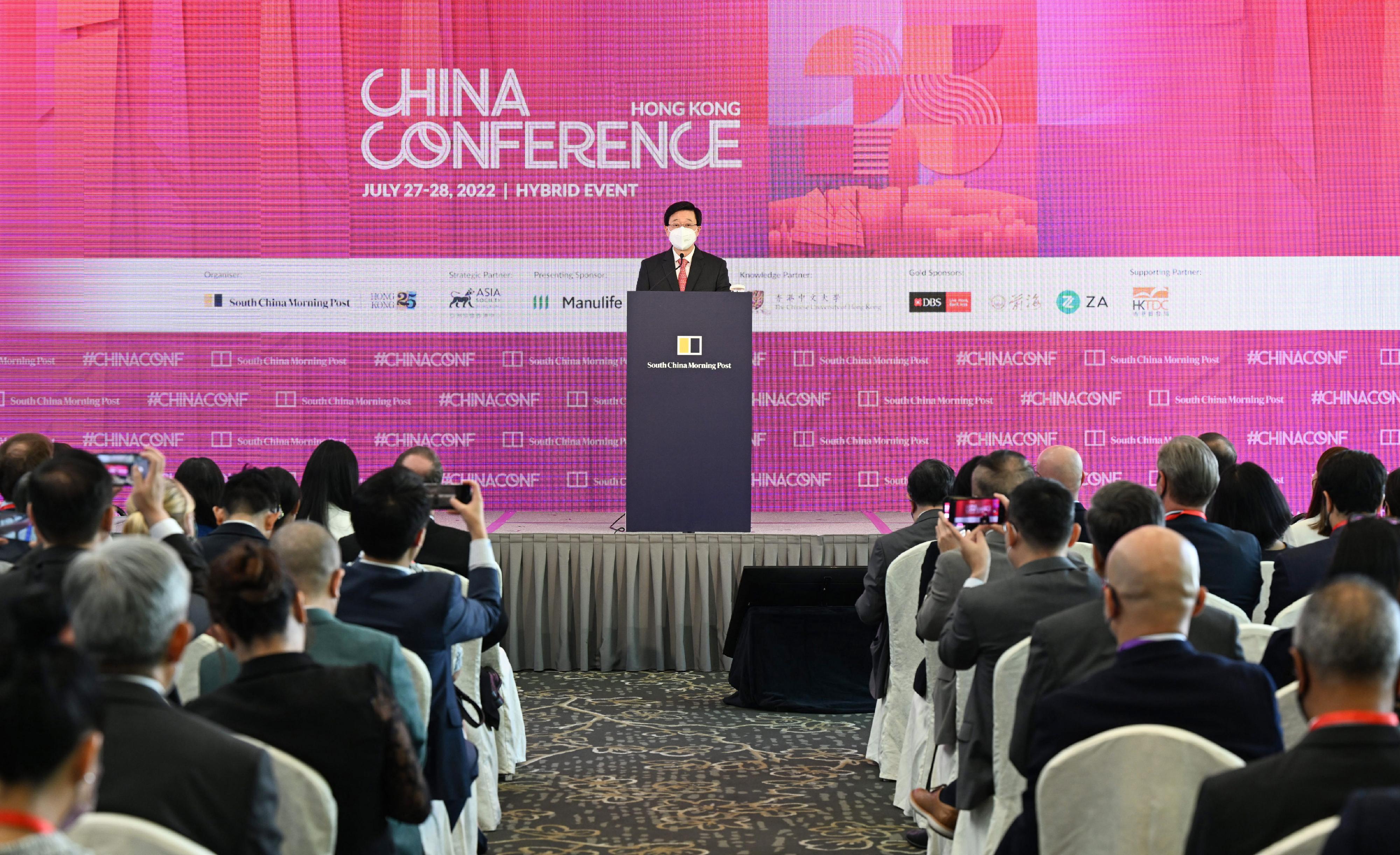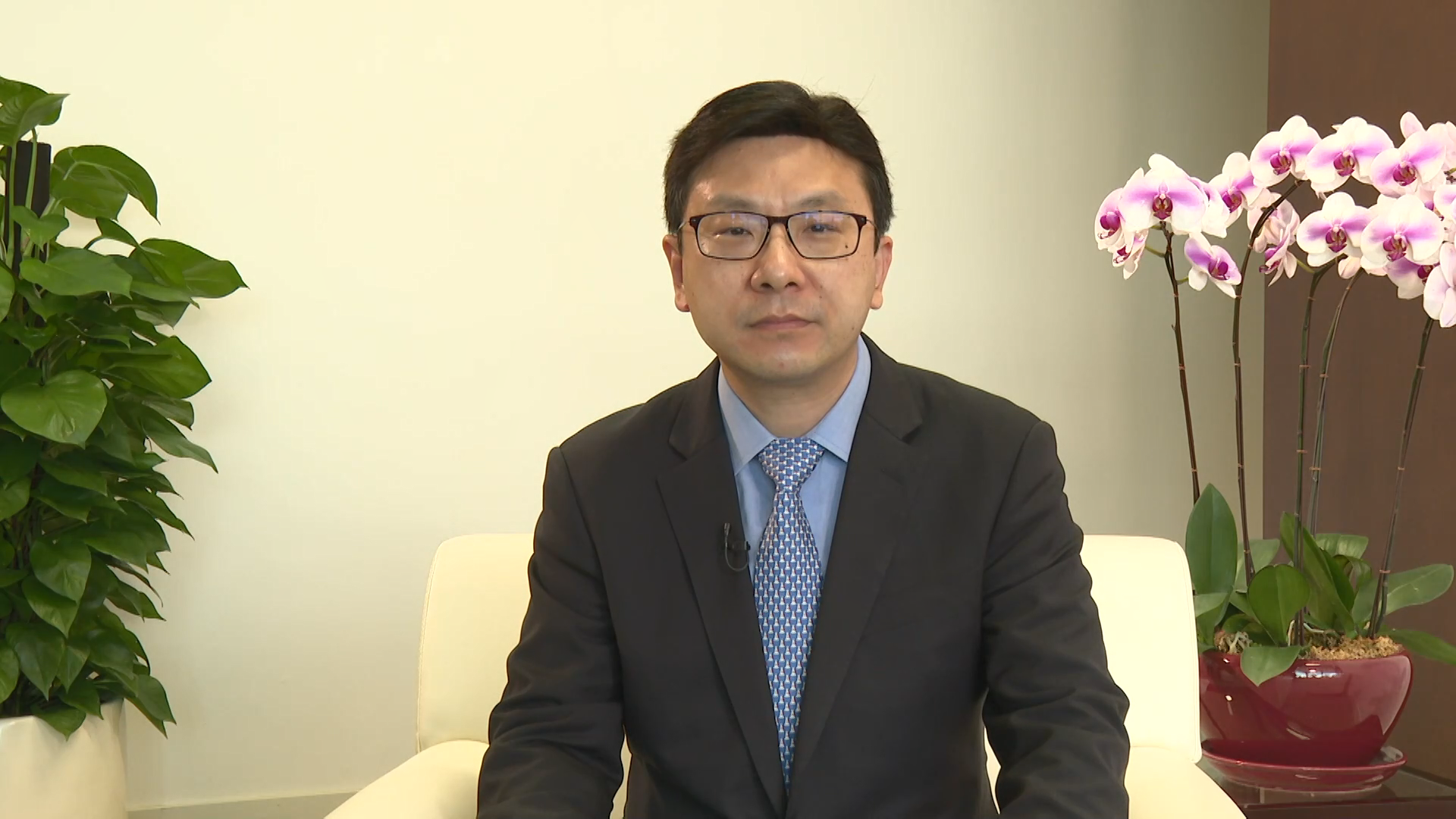Following is the speech by the Chief Executive, Mr John Lee, at the South China Morning Post (SCMP) China Conference Hong Kong 2022 today (July 27):
Ms Catherine So (Chief Executive Officer of SCMP), Ms Tammy Tam (Editor-in-Chief of SCMP), Mr Ronnie Chan (Chairman Emeritus of the Asia Society), consuls general, Mr Damien Green (President and Chief Executive Officer of Manulife Asia), distinguished speakers, distinguished guests, ladies and gentlemen,
Good afternoon. I'm delighted to be here today for the opening of the China Conference Hong Kong 2022, the sixth edition of this notable annual gathering. For that, and for giving me this good opportunity to speak to you, my thanks go to the organiser, the South China Morning Post.
Just a few weeks ago, we celebrated the 25th anniversary of the establishment of the Hong Kong Special Administrative Region (HKSAR). Hand in hand with that historic occasion, we acknowledged, as well, the 25th anniversary of the implementation of the "one country, two systems" principle.
For the past quarter of a century, this great principle has served as the strong foundation of Hong Kong's prosperity and stability. Hong Kong has clearly flourished under "one country, two systems".
Today, we are one of the world's top three financial centres, the fifth-most competitive economy, a major trading and logistics hub, a rising innovation and technology centre and the vital business bridge between our country and the rest of the world.
President Xi Jinping, who was in Hong Kong for the 25th anniversary of the HKSAR, spoke of Hong Kong on July 1 – and I quote – "proactively integrating itself into the country's overall development and carving out its role in national strategies".
The safeguarding of national security and the prioritising of social stability are also essential aspects of our integration into the country's development. And there is no question that the National Security Law, adopted two years ago, has returned stability and confidence to the streets of Hong Kong and to our economy. The improved electoral system has also ensured that the "patriots administering Hong Kong" principle is fully put into practice, which is necessary and conducive to effective governance.
Our way ahead, and our flourishing future, will continue to be predicated on "two systems", as well as "one country". On this, President Xi reassured us all. He said, "The more firmly the 'one country' principle is upheld, the greater strength the 'two systems' will be unleashed for the development of the SARs."
As the President underlined in his speech to the people of Hong Kong, and I quote: "The Central Government fully supports Hong Kong in its effort to maintain its distinctive status and edges, to improve its presence as an international financial, shipping and trading centre, to keep its business environment free, open and regulated, and to maintain the common law, so as to expand and facilitate its exchanges with the world".
I can tell you that President Xi was speaking directly to you, to each and every one of you, whatever your ambitions. Whatever you want to accomplish, the doors to Hong Kong remain wide open and welcoming.
So, to answer the question posed by the theme of this year's China Conference – "Where does Hong Kong stand 25 years after the handover?" – it is clear that we have come a long and rewarding way, that we are in an enviable position, despite the challenges of the past few years.
That said, I'm not here to "stand". Hong Kong will move forward. I'm here to lead Hong Kong in breaking new ground and achieving another leap forward in prosperity in the coming five years. And I'm blessed – Hong Kong is blessed – to be able to do so under the innovative and great principle of "one country, two systems".
President Xi's important speech on July 1 serves as the blueprint and beacon for the HKSAR Government in the governance of Hong Kong in the coming five years. My roadmap for Hong Kong is in line with the "four proposals" or "four hopes" outlined by the President:
• First: improving governance. It means upholding the rule of law as a core value. It means instilling a results-oriented approach throughout government and the civil service. It means streamlining government procedures, including our response to COVID based on science and precision. It also means providing prompt and high-level leadership to solving our problems. For that, I have set up four dedicated task forces led by the most senior officials of my governing team, to tackle the wide-ranging issues of intergenerational poverty and district matters, and to strive for more and faster production of land and housing.
• Second: seizing the boundless opportunities offered by our country through the National 14th Five-Year Plan, the Guangdong-Hong Kong-Macao Greater Bay Area, the Belt and Road and other initiatives to create strong impetus for growth – not only in maintaining our enviable status as an international financial, shipping and trading centre, but also venturing into such burgeoning areas as innovation and technology as well as arts and culture.
• Third: putting the people of Hong Kong first, helping them – all 7.4 million of them – to a more rewarding and prosperous life, to better education and healthcare, and at every stage of their lives; to address the housing problem by doing things faster, in greater quantities, and more efficiently.
• Fourth: safeguarding our hard-won stability and harmony, seeking common ground at every turn. No less important, it means ensuring that our young people cultivate a sense of pride in our country, as well as in the HKSAR.
In each of these four interlinked strategies, we will be guided by the "one country, two systems" principle.
I shall announce my first Policy Address in October. For that, we have just launched a public consultation. I welcome you all to send us your views and drive us to better serve the citizens and the development of Hong Kong. Together, we shall seize the opportunities ahead.
Ladies and gentlemen, from disarray to good governance, Hong Kong is entering a new phase of becoming more prosperous in the next five years. I am determined that the whole government will be working, pragmatically and passionately, for Hong Kong – and our country, building a future we will all be proud of.
The challenges are daunting. But in "one country, two systems", and our East-meets-West position, as well as the talent and resilience of the people of Hong Kong, I'm confident we have what we need to accomplish what we must.
My thanks, once again, to the South China Morning Post for organising this timely, two-day China Conference. I know you will all enjoy it, and I wish you the best of business, and health, in the coming year.
Thank you.




